INTERNACIONAL
Nuclear watchdog urges ‘trust but verify’ that Iran engages in good-faith negotiations
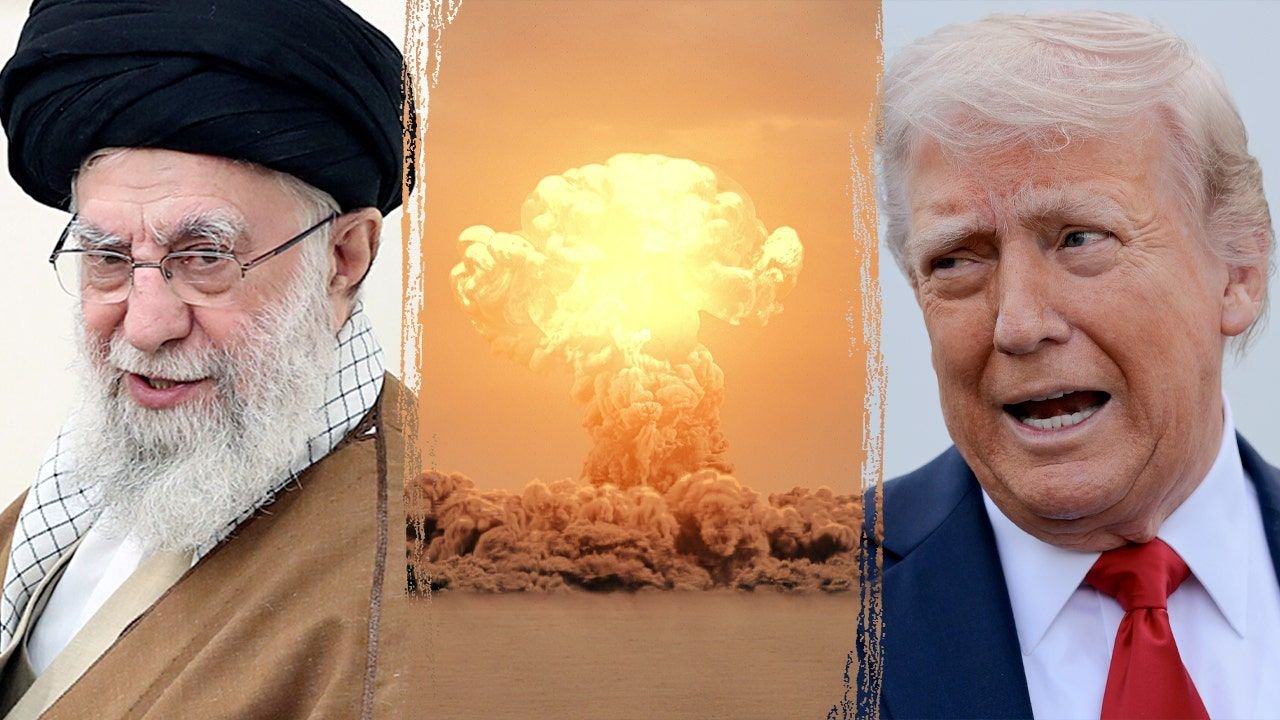
Much remains unknown regarding the progress of Washington’s nuclear talks with Iran, but the head of the U.N. nuclear watchdog, the International Atomic Energy Agency (IAEA), said the international community must «trust but verify» that Tehran is engaging in good-faith negotiations.
The U.S. and Iran are set to hold a third round of discussions on Saturday, which will deal with the technical aspects of Iran’s nuclear program, as well as political negotiations, according to reports.
IAEA Director General Rafael Grossi has applauded the U.S.-Iran negotiations mediated by Oman, but said the top nuclear agency has not yet been asked to assist in the negotiations, though he has been in communication with Middle East envoy Steve Witkoff.
US CONFIRMS THIRD ROUND OF NUCLEAR TALKS WITH IRAN AFTER ‘VERY GOOD PROGRESS’
International Atomic Energy Agency Director General Rafael Grossi looks on as he addresses the media during the Board of Governors meeting in Vienna on Sept. 9, 2024. (Reuters/Leonhard Foeger/File Photo)
«I think there’s a general expectation that this goes well, and that the agreement is verified by the IAEA,» Grossi told reporters from Washington, D.C., on Wednesday. «It’s good the United States and Iran have a direct conversation. Of course, there are parallel processes.
«We have to keep our eyes on the ball. We must avoid Iran or prevent Iran from getting weapons. This is the objective.»
Grossi said that from the perspective of not only the top nuclear agency, but from world leaders he has been in communication with, there is a «degree of expectation» that after the political agreements are hashed out between Washington and Tehran, it will be the IAEA that makes the nuclear terms «credible» and «verifiable.»
«They all are expecting the IAEA to step in at the right time,» he said. «We are at their service to support, to make this thing credible. In a certain sense, they may have a political agreement, but then we have to make it verifiable.»
IRAN’S LONG TRAIL OF DECEPTION FUELS SKEPTICISM OVER NEW NUCLEAR DEAL AS TALKS CONTINUE
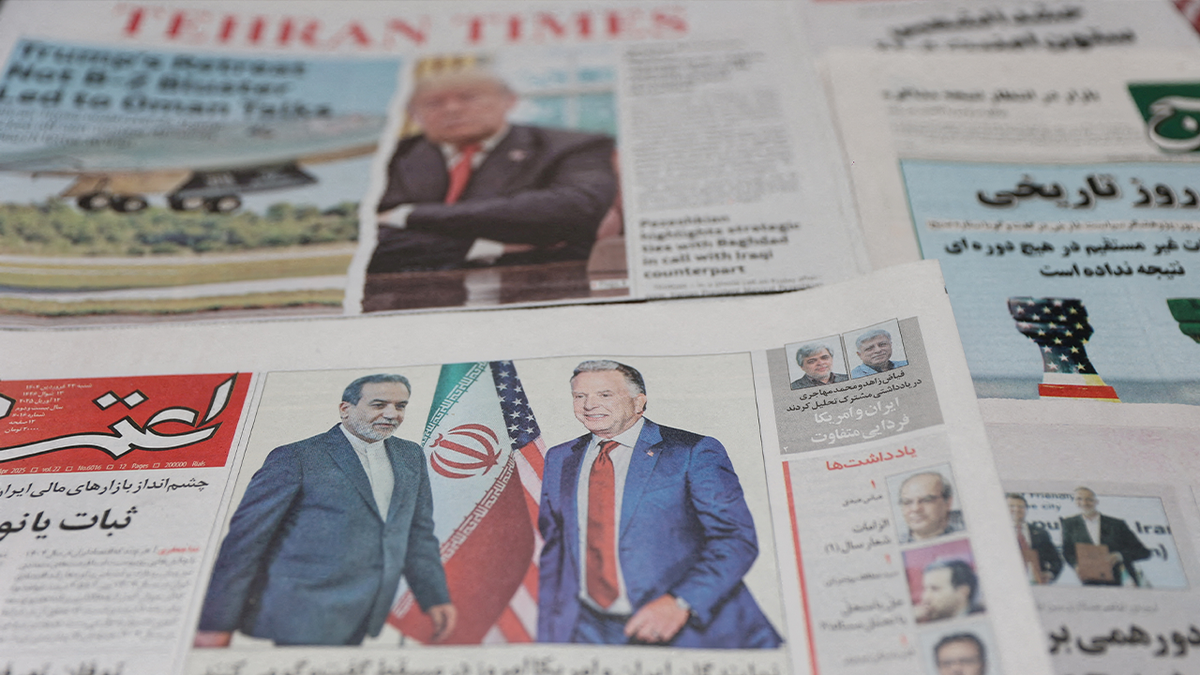
An Iranian newspaper with a cover photo of Iran’s Foreign Minister Abbas Araghchi and U.S. Middle East envoy Steve Witkoff is seen in Tehran, Iran, on April 12. (Majid Asgaripour/WANA (West Asia News Agency) via Reuters)
Fox News Digital obtained a copy of an address Iranian Foreign Minister Abbas Araghchi — who traveled to China on Wednesday to reportedly discuss progress in the nuclear negotiations — was set to give at the Carnegie International Nuclear Policy Conference, though he never delivered the address due to format change requests by Tehran that were denied by the host.
But in his address, he was set to position Iran as a proponent of nuclear non-proliferation and said Iran’s position had been «mischaracterized.»
Since the U.S.’ withdrawal from the Joint Comprehensive Plan of Action (JCPOA), which Tehran has argued made the deal mute, Iran has significantly advanced its programs by stockpiling near-weapons-grade-enriched uranium to levels that, if further enriched, could produce five nuclear warheads, as well as its centrifuges and missile capabilities.
When asked by Fox News Digital if Grossi assessed the Islamic Republic’s position to be honest, he said, «Trust, but verify. We need to verify.»
«We are inspectors — that’s the only way we build trust,» he added.
Grossi said the administration needs to identify what the end goals of this latest deal will be, as the framework of the JCPOA — widely criticized by Trump — is now very dated due to the advancements Iran has made.
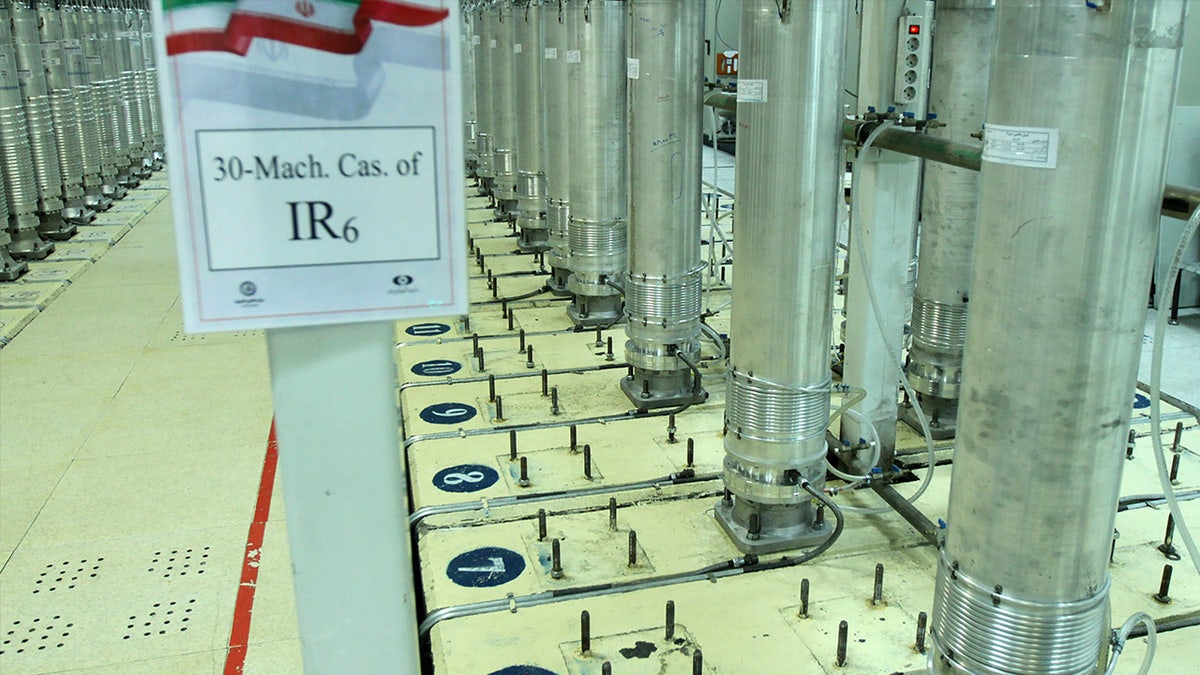
This photo released on Nov. 5, 2019, by the Atomic Energy Organization of Iran shows centrifuge machines in the Natanz uranium enrichment facility in central Iran. (Atomic Energy Organization of Iran via AP, File)
CLICK HERE TO GET THE FOX NEWS APP
Issues like uranium stockpiles, inventories, centrifuge advances and weaponization capabilities are all on the table in the U.S.-Iran negotiations.
«We have a much more complex field in front of us,» Grossi warned. «The good thing is we know what we need to look at. We have a unique perspective of that.»
INTERNACIONAL
Una presentadora generada por Inteligencia Artificial condujo un documental en un canal británico: «No existo», dijo al final

Este lunes por la tarde, la cadena pública británica Channel 4 emitió una provocadora demostración del futuro laboral al poner al aire un documental bajo la conducción de una presentadora generada íntegramente por inteligencia artificial (IA). Este audaz experimento, parte del programa de investigación Dispatches, reabrió el debate global sobre el impacto ético y económico de la IA en el periodismo.
La presentadora virtual, llamada Aisha Gaban, una mujer morena de cabello hasta los hombros y aspecto hiperrealista, abrió el programa, titulado «¿Me quitará la IA mi trabajo?», con un mensaje directo a la audiencia: «La IA afectará la vida de todos en los próximos años. Y a algunos, les hará perder sus trabajos». Y, en un giro meta-narrativo, se incluyó a sí misma: «¿Empleados de call center? ¿Agentes de servicio al cliente? Quizás incluso presentadoras de televisión, como yo».
Solo al final del documental, que exploró las transformaciones del trabajo en sectores como el derecho, la música, la moda y la medicina, Gaban reveló su naturaleza digital. «No existo», dijo simplemente, afirmando ser la primera presentadora generada por IA en la televisión británica. «No estuve en los lugares para cubrir la noticia. Mi imagen y mi voz se generaron mediante inteligencia artificial», explicó, a pesar de haber aparecido en diversas locaciones a lo largo del metraje.
El experimento de Channel 4, si bien fue un truco concebido para alertar sobre la disrupción tecnológica, generó un comunicado de la jefa de noticias del canal, Louisa Compton, que subraya la postura crítica de los medios tradicionales. Compton aseguró que «usar un presentador generado por IA no es algo que vayamos a adoptar regularmente en Channel 4″.
«Al contrario, nuestra prioridad sigue siendo un periodismo de calidad, verificado, imparcial y digno de confianza, algo que la IA no es capaz de ofrecer», añadió Compton. La cadena reconoció que la experiencia es un «útil recordatorio del potencial disruptivo de la IA y de la facilidad con la que puede engañar a la audiencia con contenido que no tiene forma de verificar». Esta preocupación ética es central en la industria, donde la mayoría de las audiencias, según encuestas recientes, desconfía de las noticias generadas principalmente por algoritmos sin intervención humana.
El uso de la IA en la televisión como presentador visible no es completamente nuevo, aunque sigue siendo minoritario. Desde 2018, la agencia de noticias oficial china, Xinhua, ha utilizado versiones digitales de sus presentadores habituales para emitir noticias las 24 horas del día. Más recientemente, figuras de IA han debutado en noticieros de India, Kuwait, Tailandia y otras naciones de Asia, a menudo con el argumento de optimizar costos y ofrecer transmisiones ininterrumpidas.
Sin embargo, en el periodismo, la IA se emplea mayoritariamente “detrás de escena”.
Generación de contenido rápido: Sistemas automatizados, como el utilizado por Los Angeles Times para informar instantáneamente sobre terremotos (Quakepot), o el Cyborg de Bloomberg News para analizar informes financieros y redactar notas basadas en hechos y cifras.
Verificación y fact-checking: Herramientas de IA que ayudan a los periodistas a verificar informaciones, detectar noticias falsas y diferenciar discursos de odio, un uso respaldado por organismos como la UNESCO.
Tareas de soporte: Uso de software de IA como asistente editorial para revisar gramática, generar emails y realizar borradores, optimizando el tiempo del reportero.
La controversia, sin embargo, se profundiza no solo con los presentadores virtuales, sino con la generación de contenido engañoso (deepfakes) y la sustitución de escritores humanos. La misma tecnología que creó a Aisha Gaban fue la que en septiembre generó indignación en Hollywood con la aparición de Tilly Norwood, una actriz creada por IA con la ambición de ser «la próxima Scarlett Johansson o Natalie Portman», lo que plantea serios desafíos para la propiedad intelectual y los puestos de trabajo creativos.
INTERNACIONAL
SCOOP: Trump-backed former Navy SEAL launches GOP primary challenge against Massie

NEWYou can now listen to Fox News articles!
FIRST ON FOX – A former longtime Navy SEAL and fifth-generation Kentucky farmer who is backed by President Donald Trump on Tuesday declared his candidacy in the state’s 4th Congressional District, as he challenges Republican Rep. Thomas Massie in next year’s GOP primary.
«I’ve dedicated my life to serving my country, and I’m ready to answer the call again,» Ed Gallrein said in a statement shared first with Fox News Digital.
And pointing to Massie, a frequent GOP critic of the president during his second term in the White House, Gallrein emphasized, «This district is Trump Country. The President doesn’t need obstacles in Congress – he needs backup. I’ll defeat Thomas Massie, stand shoulder to shoulder with President Trump, and deliver the America First results Kentuckians voted for.»
The campaign launch comes four days after Trump took to social media to praise Gallrein, urge him to run, and blast Massie.
MAVERICK HOUSE REPUBLICAN CASHES IN ON TRUMP’S ATTACKS
Representative Thomas Massie, a Republican from Kentucky, arrives for a news conference outside the US Capitol in Washington, DC, on Wednesday, Sept. 3, 2025 (Graeme Sloan/Bloomberg via Getty Images)
Trump argued that Massie was a «Third Rate Congressman,» a «Weak and Pathetic RINO,» and a «totally ineffective LOSER who has failed us so badly.»
And the president applauded Gallrein, calling him a «Brave Combat Veteran» and a «very successful Businessman» who, if elected to Congress, would «fight tirelessly to Keep our now very Secure Border, SECURE, Stop Migrant Crime, and Defend our always under siege Second Amendment.»
HEAD HERE FOR THE LATEST FOX NEWS REPORTING ON THE 2025 ELECTIONS
Trump’s social media post included a photo of himself and Gallrein holding red MAGA hats in the Oval Office.
Gallrein served three decades in uniform, rising to the rank of Captain. According to his campaign bio, he served multiple times on SEAL Team SIX, deploying to Panama, Afghanistan, and Iraq, and earned four Bronze Stars and two Presidential Unit Citations.
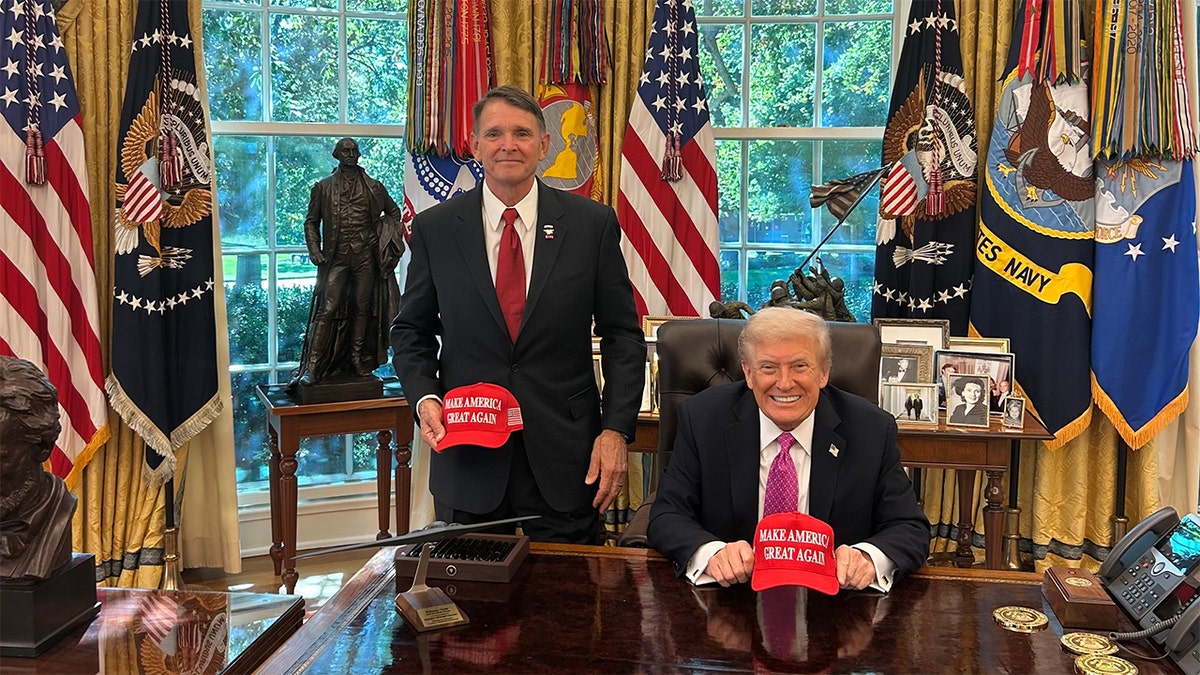
Ed Gallrein, left, seen with President Donald Trump in the Oval Office at the White House, on Tuesday launched a congressional bid to primary challenge Republican Rep. Thomas Massie of Kentucky, Gallrein’s campaign launch comes four days after Trump backed him and urged him to run. (Ed Gallrein congressional campaign)
His campaign release also highlighted that «Gallrein’s roots run deep in Kentucky.» He was born and raised in the state. And his family, which has farmed for over a century, built Kentucky’s largest dairy farm and Gallrein Grain Farms, one of the state’s largest grain operations.
Massie took aim at Gallrein following Trump’s social media endorsement, calling him a «failed candidate and establishment hack,» as he pointed to Gallrein’s unsuccessful run last year for the state Senate.
MASSIE FIRES BACK AFTER JOHNSON CALLS HIS EPSTEIN RECORDS PUSH ‘MEANINGLESS’
«After having been rejected by every elected official in the 4th District, Trump’s consultants clearly pushed the panic button with their choice of failed candidate and establishment hack Ed Gallrein,» Massie said in a statement to Politico. «Ed’s been begging them to pick him for over three months now.»
Trump started targeting Massie for ouster earlier this year over the seven-term lawmaker’s opposition to the «One Big Beautiful Bill,» which passed the GOP-controlled Congress early in the summer nearly entirely along party lines. The sweeping GOP megalaw is the president’s major legislative achievement since returning to the White House.

Rep. Marjorie Taylor Greene (R-GA) speaks with Rep. Thomas Massie (R-KY) and Rep. Ro Khanna (D-CA) during a news conference with alleged victims of disgraced financier and sex trafficker Jeffrey Epstein outside the U.S. Capitol on September 3, 2025, in Washington, DC. (Chip Somodevilla/Getty Images)
Massie is also leading the push, along with Democratic Rep. Ro Khanna of California, in forcing a House floor vote to urge the release of the Justice Department’s files on the late convicted sex-trafficker Jeffrey Epstein, a move the White House and House GOP leaders have aimed to counter. Massie is on the verge of reaching the needed 218 signatures to force the vote.
Two top Trump political advisers — 2024 co-campaign manager Chris LaCivita and pollster Tony Fabrizio — in June launched a super PAC that aims to defeat Massie. Nearly $2 million has been spent already to run TV ads targeting Massie.
CLICK HERE TO GET THE FOX NEWS APP
But Massie has used the attacks from Trump and his allies to boost fundraising, hauling in more than $750,000 the past three months, which was the best fundraising quarter of his congressional career.
Massie’s district, in the northeastern part of the state, includes Louisville’s eastern suburbs and Cincinnati’s Kentucky suburbs.
donald trump,republicans elections,elections,midterm elections,house of representatives,congress,kentucky,campaigning
INTERNACIONAL
La Unión Europea acordó adelantar al 2028 la desconexión de las importaciones de hidrocarburos rusos
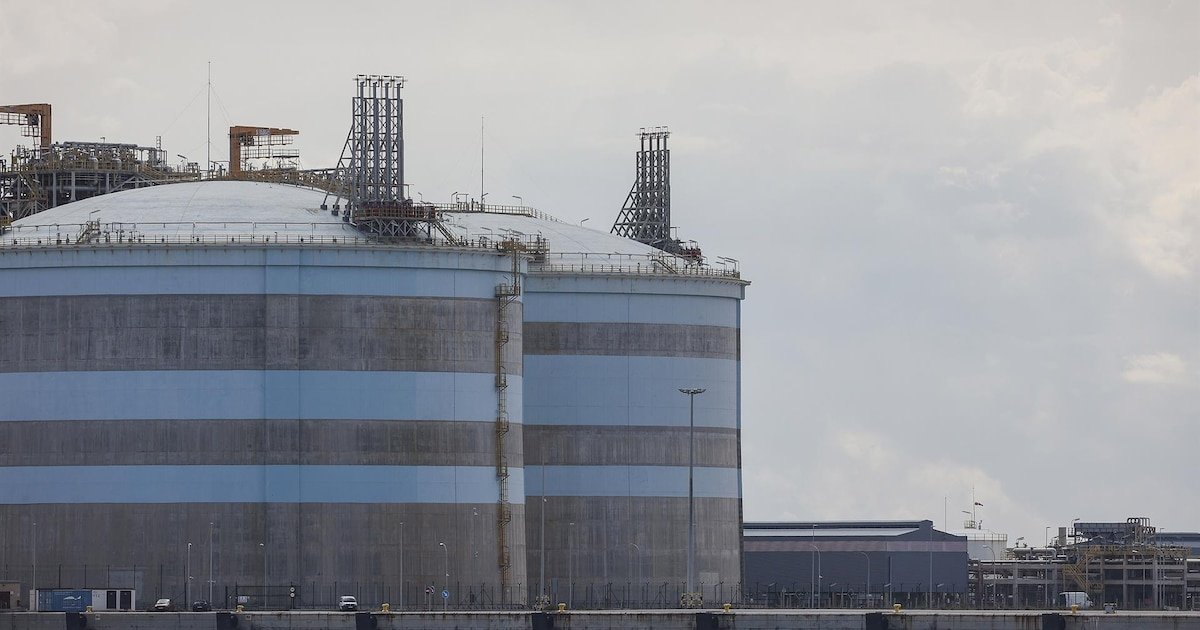
Los países de la Unión Europea respaldaron el lunes, con la oposición de Eslovaquia y Hungría, la propuesta de la Comisión Europea para adelantar a 2028 la desconexión de la UE de las importaciones de hidrocarburos rusos, normativa que aún tendrá que negociarse con el Parlamento Europeo, que quiere acelerar un año más.
«Se trata de una decisión muy importante“, dijo tras el acuerdo entre los ministros de Energía de los Veintisiete el comisario europeo de Energía y Vivienda, Dan Jørgensen, quien aseguró que el Ejecutivo ayudará en la transición “a todos los Estados miembros, incluidos aquellos que no apoyan la legislación”.
Los Estados miembros, con amplio apoyo y algunas reservas específicas, secundaron la propuesta de la Comisión Europea que, presionada por Estados Unidos, planteó que la UE acabe con los contratos de gas ruso a corto plazo en 2027, y un año después con los acuerdos a largo plazo, tanto por gasoducto como por barco.
El Consejo plantea que las modificaciones de los contratos solo se permitan por razones operativas sin aumentar volúmenes, con algunas flexibilidades para los países sin acceso al mar, y propone simplificar las obligaciones aduaneras con un sistema de autorización previa y exenciones para determinados orígenes.
Las capitales deben negociar ahora con el Parlamento Europeo, que quiere adelantar un año el calendario, con la intención de cerrar el texto antes de fin de año.
Desde la invasión de Ucrania, la UE ha prohibido las compras a Rusia de carbón y de casi todo el petróleo, pero no del gas. No obstante, antes de la guerra la Unión compraba a Moscú el 45% del gas que consumía y ha rebajado ese volumen hasta niveles que actualmente rondan el 13%.
El nuevo paso supone la ruptura total y más rápida de lo previsto, lo que genera inquietud. Grecia apoyó “completamente” la desconexión, pero pidió “medidas para corregir las perturbaciones del mercado”.
En cambio, Eslovaquia, uno de los mayores aliados de Rusia en la UE, votó en contra, argumentando que comprometería su seguridad energética. Lo mismo hizo Hungría, que sostuvo que el petróleo que podría recibir a través de Croacia no sería suficiente y dejaría a Budapest sujeta al “monopolio” de una sola vía de suministro y un tránsito con tasas elevadas, según dijo el titular húngaro Péter Szijjártó.
La posición de Hungría recibió críticas de otros socios, como Croacia, que garantizó que tiene “plena capacidad” de abastecer a Budapest, y Letonia, que cuestionó si hace falta otra “tragedia” para acabar con la dependencia energética de Moscú. Polonia agregó: “No estamos aquí para hablar de matemáticas ni números, aunque sean importantes, sino de valores”.
Otros países, como la presidencia danesa de turno del Consejo, celebraron que el bloque comunitario vaya a “dejar de financiar la máquina de guerra de Rusia” y subrayaron que “la energía que consumimos tiene que alejarse de los combustibles fósiles”.
El acuerdo es “el principio de una transición” hacia una economía descarbonizada, afirmó el ministro de Clima y Energía de Dinamarca, Lars Aagaard. En la misma línea se posicionó España, a través del secretario de Estado de Energía, Joan Groizard, quien destacó que “la energía no puede ser un arma de guerra” y mostró su apoyo al texto porque es “de alcance europeo” y contiene medidas “jurídicamente solventes”.
Groizard agregó que no basta con sustituir la dependencia energética de Rusia por otra: «No se puede dejar que un tercer país esté en disposición de chantajear a Europa en términos energéticos“.
La presidencia danesa señaló que la solución a la dependencia energética llegará a largo plazo con energía renovable autogenerada en la UE, y Jørgensen respaldó esa postura, asegurando que trabajan “muy, muy duro con los Estados miembros para ayudarles de forma que no haya ningún problema de seguridad de suministro ni subidas de precio”.
(Con información de EFE)
Diplomacy / Foreign Policy,Europe,COPENHAGEN

 CHIMENTOS2 días ago
CHIMENTOS2 días agoLa fuerte actitud de Manu Urcera con Indiana Cubero que reveló la verdad de la interna familiar: “El saludo del piloto a la hija de Nicole Neumann por su cumpleaños”

 POLITICA3 días ago
POLITICA3 días agoUn juez federal rechazó el habeas corpus presentado por Lázaro Báez y ordenó trasladarlo a la cárcel de Ezeiza

 CHIMENTOS1 día ago
CHIMENTOS1 día agoLa cruda confesión del Turco Naim a 1 año de la separación de Emilia Attias: «Me di cuenta que hay que aprender a estar solo»













